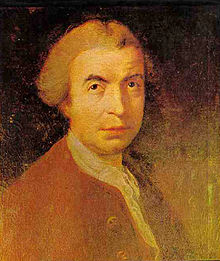Roger Boscovich
| Roger Joseph Boscovich | |
|---|---|

Portrait by Robert Edge Pine, London, 1760.
|
|
| Born |
18 May 1711 Dubrovnik, Republic of Ragusa (modern-day Croatia) |
| Died | 13 February 1787 (aged 75) Milan, Duchy of Milan (modern-day Italy) |
| Residence | Dubrovnik, Rome, Venice, Paris, Constantinople, Milan, Bassano |
| Citizenship | Republic of Ragusa |
| Fields | Theology, Physics, Astronomy, Mathematics, Natural philosophy, Diplomacy, Poetry |
| Institutions |
Brera Observatory University of Pavia |
| Alma mater | Collegio Romano |
| Known for | Precursor of the Atomic theory Founder of Brera Observatory |
| Influences | G. W. Leibniz |
Roger Joseph Boscovich (Croatian: Ruđer Josip Bošković, pronounced [rûd͡ʑer jǒsip bôʃkoʋit͡ɕ], Italian: Ruggiero Giuseppe Boscovich,Latin: Rodericus Iosephus Boscovicus; 18 May 1711 – 13 February 1787) was a Ragusan physicist, astronomer, mathematician, philosopher, diplomat, poet, theologian, Jesuit priest, and a polymath from the city of Dubrovnik (modern-day Croatia), who studied and lived in Italy and France where he also published many of his works. He was nicknamed the Croatian Leibniz by Werner Heisenberg.
He produced a precursor of atomic theory and made many contributions to astronomy, including the first geometric procedure for determining the equator of a rotating planet from three observations of a surface feature and for computing the orbit of a planet from three observations of its position. In 1753 he also discovered the absence of atmosphere on the Moon.
...
Wikipedia
